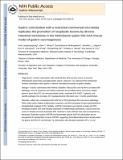| dc.contributor.author | Lertpiriyapong, Kvin | |
| dc.contributor.author | Whary, Mark T. | |
| dc.contributor.author | Muthupalani, Sureshkumar | |
| dc.contributor.author | Lofgren, Jennifer L. | |
| dc.contributor.author | Gamazon, Eric R. | |
| dc.contributor.author | Feng, Yan | |
| dc.contributor.author | Ge, Zhongming | |
| dc.contributor.author | Wang, Timothy C. | |
| dc.contributor.author | Fox, James G. | |
| dc.date.accessioned | 2014-08-15T16:43:51Z | |
| dc.date.available | 2014-08-15T16:43:51Z | |
| dc.date.issued | 2013-06 | |
| dc.date.submitted | 2013-06 | |
| dc.identifier.issn | 0017-5749 | |
| dc.identifier.issn | 1468-3288 | |
| dc.identifier.uri | http://hdl.handle.net/1721.1/88723 | |
| dc.description.abstract | Objectives: Gastric colonisation with intestinal flora (IF) has been shown to promote Helicobacter pylori (Hp)-associated gastric cancer. However, it is unknown if the mechanism involves colonisation with specific or diverse microbiota secondary to gastric atrophy.
Design: Gastric colonisation with Altered Schaedler's flora (ASF) and Hp were correlated with pathology, immune responses and mRNA expression for proinflammatory and cancer-related genes in germ-free (GF), Hp monoassociated (mHp), restricted ASF (rASF; 3 species), and specific pathogen-free (complex IF), hypergastrinemic INS-GAS mice 7 months postinfection.
Results: Male mice cocolonised with rASFHp or IFHp developed the most severe pathology. IFHp males had the highest inflammatory responses, and 40% developed invasive gastrointestinal intraepithelial neoplasia (GIN). Notably, rASFHp colonisation was highest in males and 23% developed invasive GIN with elevated expression of inflammatory biomarkers. Lesions were less severe in females and none developed GIN. Gastritis in male rASFHp mice was accompanied by decreased Clostridum species ASF356 and Bacteroides species ASF519 colonisation and an overgrowth of Lactobacillus murinus ASF361, supporting that inflammation-driven atrophy alters the gastric niche for GI commensals. Hp colonisation also elevated expression of IL-11 and cancer-related genes, Ptger4 and Tgf-β, further supporting that Hp infection accelerates gastric cancer development in INS-GAS mice.
Conclusions: rASFHp colonisation was sufficient for GIN development in males, and lower GIN incidence in females was associated with lower inflammatory responses and gastric commensal and Hp colonisation. Colonisation efficiency of commensals appears more important than microbial diversity and lessens the probability that specific gastrointestinal pathogens are contributing to cancer risk. | en_US |
| dc.description.sponsorship | National Institutes of Health (U.S.) (grant R01 AI37750) | en_US |
| dc.description.sponsorship | National Institutes of Health (U.S.) (grant R01 CA093405) | en_US |
| dc.description.sponsorship | National Institutes of Health (U.S.) (grant P30-ES02109) | en_US |
| dc.description.sponsorship | National Institutes of Health (U.S.) (grant P01 CA028842) | en_US |
| dc.description.sponsorship | National Institutes of Health (U.S.) (grant T32 RR07036) | en_US |
| dc.language.iso | en_US | |
| dc.publisher | BMJ Publishing Group | en_US |
| dc.relation.isversionof | http://dx.doi.org/10.1136/gutjnl-2013-305178 | en_US |
| dc.rights | Creative Commons Attribution-Noncommercial-Share Alike | en_US |
| dc.rights.uri | http://creativecommons.org/licenses/by-nc-sa/4.0/ | en_US |
| dc.source | PMC | en_US |
| dc.title | Gastric colonisation with a restricted commensal microbiota replicates the promotion of neoplastic lesions by diverse intestinal microbiota in the Helicobacter pylori INS-GAS mouse model of gastric carcinogenesis | en_US |
| dc.type | Article | en_US |
| dc.identifier.citation | Lertpiriyapong, K., M. T. Whary, S. Muthupalani, J. L. Lofgren, E. R. Gamazon, Y. Feng, Z. Ge, T. C. Wang, and J. G. Fox. “Gastric Colonisation with a Restricted Commensal Microbiota Replicates the Promotion of Neoplastic Lesions by Diverse Intestinal Microbiota in the Helicobacter Pylori INS-GAS Mouse Model of Gastric Carcinogenesis.” Gut 63, no. 1 (January 1, 2014): 54–63. | en_US |
| dc.contributor.department | Massachusetts Institute of Technology. Department of Biological Engineering | en_US |
| dc.contributor.department | Massachusetts Institute of Technology. Division of Comparative Medicine | en_US |
| dc.contributor.mitauthor | Lertpiriyapong, Kvin | en_US |
| dc.contributor.mitauthor | Whary, Mark T. | en_US |
| dc.contributor.mitauthor | Muthupalani, Sureshkumar | en_US |
| dc.contributor.mitauthor | Lofgren, Jennifer L. | en_US |
| dc.contributor.mitauthor | Feng, Yan | en_US |
| dc.contributor.mitauthor | Ge, Zhongming | en_US |
| dc.contributor.mitauthor | Fox, James G. | en_US |
| dc.relation.journal | Gut | en_US |
| dc.eprint.version | Author's final manuscript | en_US |
| dc.type.uri | http://purl.org/eprint/type/JournalArticle | en_US |
| eprint.status | http://purl.org/eprint/status/PeerReviewed | en_US |
| dspace.orderedauthors | Lertpiriyapong, Kvin; Whary, Mark T; Muthupalani, Sureshkumar; Lofgren, Jennifer L; Gamazon, Eric R; Feng, Yan; Ge, Zhongming; Wang, Timothy C; Fox, James G | en_US |
| dc.identifier.orcid | https://orcid.org/0000-0001-9307-6116 | |
| mit.license | OPEN_ACCESS_POLICY | en_US |
| mit.metadata.status | Complete | |
